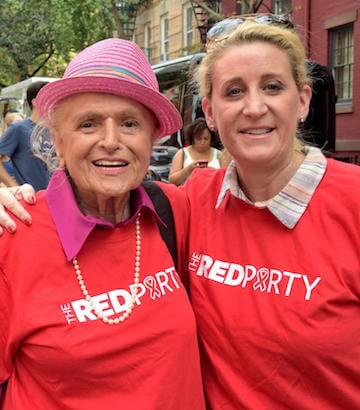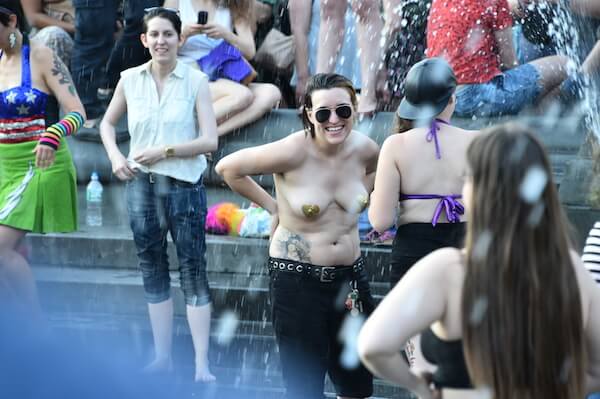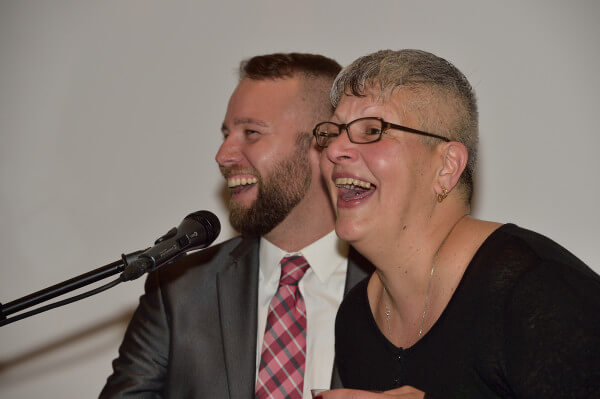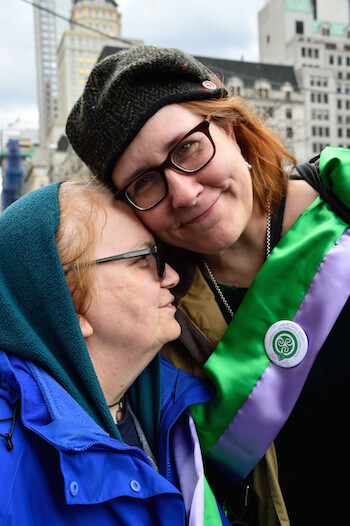Barbara Gittings picketing at Independence Hall on July 4, 1966. | KAY LAHUSEN/ COURTESY: EQUALITY FORUM
BY KELSY CHAUVIN | If there were ever a fitting tribute from one renowned LGBT civil rights leader to another, we’ll get to hear it this summer in Philadelphia. Outside Independence Hall on the Fourth of July, Kate Kendell, executive director of the National Center for Lesbian Rights (NCLR), will pay tribute to social justice pioneer Barbara Gittings.
It is a perfect pairing for a momentous occasion. Gittings, 1932-2007, was renowned for her commitment, daring, and wholehearted joie de vivre. Along with the famous image of her picketing in the 1960s at Philadelphia’s Independence Hall — holding high her sign “Homosexuals should be judged as individuals” — most every other public photograph shows her delightful smile.
Her legendary positive attitude and can-do nature always set Gittings apart. It also inspired her peers and generations of activists to do not only what was right for the LGBT rights movement as well as the broader push for social justice, but to willingly take risks to get there.
Leading lesbian legal advocate pays tribute to pioneering, pre-Stonewall activist in Fourth of July Philadelphia celebration
Kendell is one of those touched by Gittings’ trailblazing spirit, and she will proudly honor the woman who played a key role in the LGBT civil rights movement from its earliest days.
“I met Barbara pretty early in my career at NCLR,” said Kendell, who joined the organization in 1994. “The thing that I most remember is that she was so vivacious. She had so much energy and so much affection. She seemed excited every time I saw her, just by life. And by the time I met her she had nothing left to prove. She had already made such an enormous contribution. I think part of the reason she always seemed so delighted and thrilled about life is that she actually knew she had helped bend the arc of history.”
Kendell will join Malcolm Lazin, executive director of Philadelphia-based Equality Forum (equalityforum.com), and other presenters commemorating the lives and contributions of bold American leaders who led the fight for LGBT civil rights.
Barbara Gittings worked to ensure libraries across the nation included queer titles. | EQUALITY FORUM
Their presentations are part of a four-day, multi-faceted event, running July 2-5, marking the 50th anniversary of the Annual Reminder marches (lgbt50.org and the June 11 issue of Gay City News ). It was those protests, starting in 1965 in Philadelphia, that brought together Gittings, Frank Kameny, Reverend Robert Wood, and other prominent activists who helped turn the tide of US politics in favor of equality. They will be honored alongside leaders and entertainers joining the long weekend’s festivities, including Edie Windsor, Judy Shepard, Bishop Gene Robinson, Wanda Sykes, and many more.
Kendell will participate in a legal issues panel discussion on Thursday, July 2, before delivering her Gittings tribute on Saturday, July 4 at 2:30 p.m. She said she couldn’t be more proud to join the occasion and to celebrate Gittings, a woman whose self-awareness of her own impact proved an asset throughout her life.
“Barbara had achieved a level of security for LGBT people that few people could claim,” Kendell said. “She could look back and say — and Frank Kameny could as well — ‘Wow, we have come a very long way, and I did this.’ I mean, who can say that? There are a handful of people who were at the forefront of social justice movements who can claim such singular influence. And she is one of those people; one of the five most important people to advance the modern LGBT movement.”
Often called the “mother of the LGBT civil rights movement” (while Kameny, who lived in Washington, was called its “father”), Philadelphian Gittings was an unstoppable force. In 1958, commuting from her home, she organized the New York chapter of the Daughters of Bilitis, the country’s first lesbian political and civil rights group. She served as editor of the Daughters’ magazine the Ladder, the country’s first lesbian publication. She also spearheaded campaigns for everything from adding queer books to US libraries and card catalogs to successfully challenging the American Psychiatric Association to remove homosexuality from its list of mental illnesses.
Gittings’ remarkable contributions even earned her a street in Philly’s Gayborhood in 2012. Barbara Gittings Way is located on Locust Street between 12th and 13th Streets.
NCLR’s Kate Kendell will pay tribute to Barbara Gittings on July 4 in Philadelphia. | NATIONAL CENTER FOR LESBIAN RIGHTS
Kendell is keen to remind younger generations of Gittings’ immense bravery, especially back when American sentiments toward homosexuals could often be explicitly and unabashedly cruel.
“This is no hyperbole: I truly cannot imagine the courage one would have to possess to march in front of the White House or Independence Hall, carrying a sign that you are openly gay, demanding an end to the witch hunt, and an end to homosexuality as one of the traits that could deny you federal employment,” said Kendell. “And then passing out leaflets and flyers to passersby. It would be intimidating to do it today! Let alone to do it at a time when people did not even have a consciousness about LGBT people in the world.”
Kendell asserted that Gittings’ legacy has directly paved the way for LGBT accomplishments over the past 60 years. Today’s queer community continues to reap the benefits and build on the long-term momentum of her actions.
“We didn’t get here because people started working on this issue five years ago,” Kendell said. “We got here because, at tremendous personal risk, there were men and women who stood up. I certainly feel the privilege that we’re in a nation more supportive of LGBT issues than I could’ve ever imagined, largely because of the contributions of Barbara Gittings.”
Kendell added that Gittings “was so gracious and warm and supportive of those who were younger than her. She wasn’t the least bit threatened by new or younger leadership. In fact it was the opposite. She wanted to encourage us to do better, and push us to take on the next fights — knowing that even with as much as she had accomplished, we are not done… There will be a new generation of Barbara Gittings, and Frank Kamenys, and Del Martins and Phyllis Lyons. That’s what we need to begin and to close whatever the next chapter is.”
To read more about Barbara Gittings and other LGBT leaders from the past century, visit gaypioneers.com. Learn more about the NCLR at nclrights.org. For travel tips in Philadelphia on Fourth of July weekend, read Gay City News’ June 11 article at gaycitynews.nyc/passage-philadelphia.




































